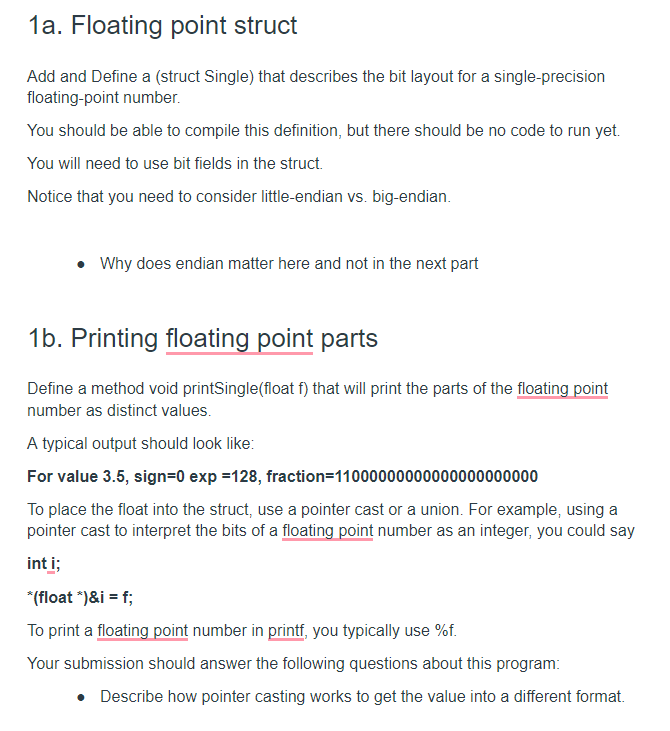This assignment is a step-by-step assignment where you build on the previous step so Please added to the existing code that I have #include int printBin(int value); int main(){ int num=10; int tobinary= printBin(num); printf("The number %d converted to binary as %d \n ",num,tobinary); unsigned int x = 1; char *ccc = (char*)&x; if(*ccc){ printf("This is Little endian"); } else{ printf("This is Big endian"); } getchar(); return 0; } int printBin(int value) { if(value<2) return value; return printBin(value / 2) *10 + value % 2; }
This assignment is a step-by-step assignment where you build on the previous step so Please added to the existing code that I have #include int printBin(int value); int main(){ int num=10; int tobinary= printBin(num); printf("The number %d converted to binary as %d \n ",num,tobinary); unsigned int x = 1; char *ccc = (char*)&x; if(*ccc){ printf("This is Little endian"); } else{ printf("This is Big endian"); } getchar(); return 0; } int printBin(int value) { if(value<2) return value; return printBin(value / 2) *10 + value % 2; }
Computer Networking: A Top-Down Approach (7th Edition)
7th Edition
ISBN:9780133594140
Author:James Kurose, Keith Ross
Publisher:James Kurose, Keith Ross
Chapter1: Computer Networks And The Internet
Section: Chapter Questions
Problem R1RQ: What is the difference between a host and an end system? List several different types of end...
Related questions
Question
This assignment is a step-by-step assignment where you build on the previous step so Please added to the existing code that I have
#include <stdio.h>
int printBin(int value);
int main(){
int num=10;
int tobinary= printBin(num);
printf("The number %d converted to binary as %d \n ",num,tobinary);
unsigned int x = 1;
char *ccc = (char*)&x;
if(*ccc){
printf("This is Little endian");
}
else{
printf("This is Big endian");
}
getchar();
return 0;
}
int printBin(int value)
{
if(value<2)
return value;
return printBin(value / 2) *10 + value % 2;
}

Transcribed Image Text:1a. Floating point struct
Add and Define a (struct Single) that describes the bit layout for a single-precision
floating-point number.
You should be able to compile this definition, but there should be no code to run yet.
You will need to use bit fields in the struct.
Notice that you need to consider little-endian vs. big-endian.
• Why does endian matter here and not in the next part
1b. Printing floating point parts
Define a method void printSingle(float f) that will print the parts of the floating point
number as distinct values.
A typical output should look like:
For value 3.5, sign=0 exp =128, fraction=11000000000000000000000
To place the float into the struct, use a pointer cast or a union. For example, using a
pointer cast to interpret the bits of a floating point number as an integer, you could say
int i;
*(float ")&i = f;
To print a floating point number in printf, you typically use %f.
Your submission should answer the following questions about this program:
• Describe how pointer casting works to get the value into a different format.
Expert Solution
This question has been solved!
Explore an expertly crafted, step-by-step solution for a thorough understanding of key concepts.
This is a popular solution!
Trending now
This is a popular solution!
Step by step
Solved in 2 steps

Recommended textbooks for you

Computer Networking: A Top-Down Approach (7th Edi…
Computer Engineering
ISBN:
9780133594140
Author:
James Kurose, Keith Ross
Publisher:
PEARSON

Computer Organization and Design MIPS Edition, Fi…
Computer Engineering
ISBN:
9780124077263
Author:
David A. Patterson, John L. Hennessy
Publisher:
Elsevier Science

Network+ Guide to Networks (MindTap Course List)
Computer Engineering
ISBN:
9781337569330
Author:
Jill West, Tamara Dean, Jean Andrews
Publisher:
Cengage Learning

Computer Networking: A Top-Down Approach (7th Edi…
Computer Engineering
ISBN:
9780133594140
Author:
James Kurose, Keith Ross
Publisher:
PEARSON

Computer Organization and Design MIPS Edition, Fi…
Computer Engineering
ISBN:
9780124077263
Author:
David A. Patterson, John L. Hennessy
Publisher:
Elsevier Science

Network+ Guide to Networks (MindTap Course List)
Computer Engineering
ISBN:
9781337569330
Author:
Jill West, Tamara Dean, Jean Andrews
Publisher:
Cengage Learning

Concepts of Database Management
Computer Engineering
ISBN:
9781337093422
Author:
Joy L. Starks, Philip J. Pratt, Mary Z. Last
Publisher:
Cengage Learning

Prelude to Programming
Computer Engineering
ISBN:
9780133750423
Author:
VENIT, Stewart
Publisher:
Pearson Education

Sc Business Data Communications and Networking, T…
Computer Engineering
ISBN:
9781119368830
Author:
FITZGERALD
Publisher:
WILEY